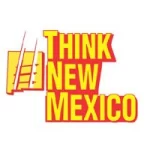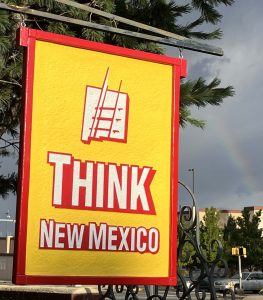 During the 2026 legislative session, Think New Mexico successfully advocated for the passage of five major reforms:
During the 2026 legislative session, Think New Mexico successfully advocated for the passage of five major reforms:
- House Bill 30, which increases the stipend for teacher residencies, making it more feasible for incoming teachers to participate in this high-quality teacher training. Read more about this reform.
- A record $13 million in this year’s budget bill (House Bill 2) for the Strategic Water Reserve, a water management tool that Think New Mexico spearheaded the development of two decades ago to keep more water in New Mexico’s rivers. Read more about this reform.
Think New Mexico also successfully opposed the passage of Senate Bill 309, which proposed to repeal the law guaranteeing that 30% of lottery revenues must go to the scholarship fund, replacing it with a flat distribution of $45 million per year. Read more about this issue.
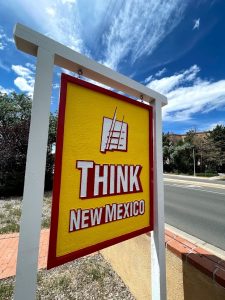 The 2026 legislative session is underway! Here are brief summaries of the bills we are working on, with links to our Action Center so you can easily contact your legislators and the governor about any of them. Please check back often, as we will continue to add bills to this list as they are introduced.
The 2026 legislative session is underway! Here are brief summaries of the bills we are working on, with links to our Action Center so you can easily contact your legislators and the governor about any of them. Please check back often, as we will continue to add bills to this list as they are introduced.
Health Care Legislation
- Join ALL the major interstate health care worker compacts New Mexico does not yet participate in. We are advocating for bills that would bring New Mexico into the interstate compacts for physicians (Senate Bill 1), psychologists (House Bill 33), counselors (House Bill 32), emergency medical personnel (House Bill 31), dentists and dental hygienists (House Bill 14), physician assistants (House Bill 10), audiologists and speech pathologists (House Bill 11), physical therapists (House Bill 12), and occupational therapists (House Bill 13). These bills would make it easier for health care providers licensed in other states to care for New Mexico patients, including via telehealth. Read more about this reform, check out the growing coalition of organizations that support it, and email your legislators and the governor to urge them to pass it!
- Add funding to the Medicaid Permanent Fund: Senate Bill 9. In 2025, Think New Mexico successfully advocated for the creation of a new permanent trust fund for Medicaid. This year we are supporting Senate Bill 9, which proposes to add $1 billion to the fund so that it will reach its $2 billion goal as quickly as possible. Once it reaches this goal, it will pay out $100 million a year that will be matched 3:1 with federal dollars, generating $400 million for Medicaid services in New Mexico. Read more about this reform and email your legislators and the governor to urge them to support it!
- Repeal the Gross Receipts Tax on coinsurance payments: Senate Bill 13 and House Bill 338. We are advocating for Senate Bill 13 and House Bill 338, which would repeal the GRT on coinsurance payments for medical services. New Mexico is now the only state that imposes this tax, and in many cases doctors are not able to pass the cost along to patients, so they end up paying it out of their own pockets. This makes it more expensive to practice medicine in New Mexico. Read more about this reform and email your legislators and the governor to urge them to pass it!
- Enhance the student loan repayment program for health care workers: House Bill 66 and Senate Bills 14 and 11. House Bill 66 and Senate Bills 14 and 11 would make New Mexico’s student loan repayment program for health care workers among the most generous in the nation. The bills would increase the maximum amount that doctors are eligible for from $75,000 over three years to $300,000 over four years. They would also increase the funding available for this program from $15 million to $25 million annually. Read more about this reform and email your legislators and the governor to urge them to pass it!
- Provide a tax credit for health care preceptors: House Bill 90 & Senate Bill 10. Preceptors are the practicing doctors and other health care professionals who provide community-based clinical education for doctors, nurses, and others. This an essential part of the training process for health care professionals. However, most preceptors in New Mexico are unpaid. House Bill 90 and Senate Bill 10 each propose to establish a new tax credit for preceptors. Read more about this reform and email your legislators and the governor to urge them to pass it!
- Create a pathway to licensure for qualified foreign-trained physicians: House Bill 127. Most doctors who are educated outside the U.S. are required to complete a U.S-based residency before they can be licensed to practice medicine here, even if they have practiced abroad for many years. House Bill 127 would create an alternate pathway to licensure for foreign-trained physicians, making it easier for qualified doctors to treat New Mexico patients. Read more about this reform and email your legislators and the governor to urge them to pass it!
Education Reform Legislation
- Maximize the amount of education funding that is spent in the classroom rather than on administrative costs: Senate Bill 178. Senate Bill 178 would require that school districts enrolling more than 2,000 students must spend at least 90% of the funding that a school generates at that school. The bill also requires that districts and charters develop evidence-based spending plans detailing how they will use state funding to provide culturally and linguistically relevant education that improves outcomes for at-risk students. Read more about this reform and email your legislators and the governor about it!
Other Legislation
- Oppose the Repeal of the 30% Guarantee for Lottery Scholarships: Senate Bill 309 Nearly two decades ago, in 2007, Think New Mexico won passage of legislation requiring the New Mexico Lottery to deliver 30% of revenues to scholarships. Before this law, the Lottery delivered an average of less than 23% per year to scholarships. Senate Bill 309 would repeal the 30% guarantee, replacing it with a flat distribution of $45 million per year ($43 million until FY29). This bill does not include an inflation adjuster and thus the value of the distribution will erode over time, costing the scholarship fund $275 million by 2050. Read more about this issue and email your legislators and the governor about it!
- Support Funding for the Strategic Water Reserve The Strategic Water Reserve is an innovative water management tool that Think New Mexico proposed and won passage of in 2005. It allows the state to buy and lease water rights to help keep our rivers flowing to meet the needs of endangered species and the state’s water delivery obligations under interstate compacts. Last year Think New Mexico partnered with a coalition to create a fund for the Strategic Water Reserve. This year we are supporting efforts to fill that fund with up to $15.5 million, as recommended by the Legislative Finance Committee and included in the budget bill (House Bill 2) as it passed the House. Read more about this reform.
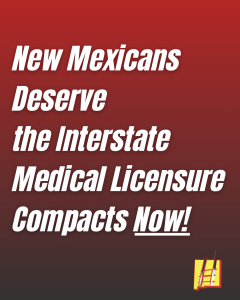 Governor Lujan Grisham called a special legislative session that will convene on Wednesday, October 1.
Governor Lujan Grisham called a special legislative session that will convene on Wednesday, October 1.
Please email your legislators and the governor and urge them to pass all of the interstate health care worker compacts during the special session!
Joining the interstate compacts for health care workers is the most impactful step that lawmakers can take to immediately expand the supply of health care providers available to New Mexicans, including via telehealth.
Passing the interstate compacts during the special session could also be worth millions of dollars for New Mexico’s rural hospitals.
The U.S. Department of Health and Human Services just released the application form that states will use to request funding from the $50 billion fund for rural hospitals that was included in the federal budget bill. The application for those federal funds awards more points to states that participate in the interstate health care worker compacts.
This means that New Mexico’s failure to participate in most of the compacts puts us at a disadvantage to other states in applying for those federal dollars!
The scoring system specifically awards additional points to states that participate in the compacts for physicians, physician assistants, emergency medical personal, nurses, and psychologists, because joining those compacts “increases the supply of accessible rural health providers [and] also increases the reach and effectiveness of telehealth in enhancing rural access.”
The deadline to apply for this one-time funding is early November, with the money awarded by the end of the year. So if lawmakers wait until the regular legislative session next January to join the compacts, it will be too late, and New Mexico’s rural hospitals may lose out on millions of dollars.
But if lawmakers pass the compacts during the special session that starts October 1, we can make it in under the deadline and maximize New Mexico’s chances of receiving urgently needed funding for our rural hospitals – while also increasing access to health care providers for all New Mexicans.
 Earlier this year a dark money group called “New Mexico Safety Over Profit” (NMSOP) was sued by the state Ethics Commission for refusing to comply with the state law that required them to disclose the sources of their funding. NMSOP was the public face of the opposition to Think New Mexico’s proposed reforms to the medical malpractice law during the last legislative session.
Earlier this year a dark money group called “New Mexico Safety Over Profit” (NMSOP) was sued by the state Ethics Commission for refusing to comply with the state law that required them to disclose the sources of their funding. NMSOP was the public face of the opposition to Think New Mexico’s proposed reforms to the medical malpractice law during the last legislative session.
NMSOP was adamant that they would not reveal their donors, telling the investigative news outlet Searchlight New Mexico: “We certainly will not be disclosing our donors, nor do we have to.”
NMSOP has now done just that.
In order to settle the 73-page legal action filed by the New Mexico Ethics Commission, NMSOP is paying a $5,000 fine, the maximum amount authorized for violations of the Lobbyist Regulation Act, and releasing their full list of donors.
So who was secretly funding this dark money group?
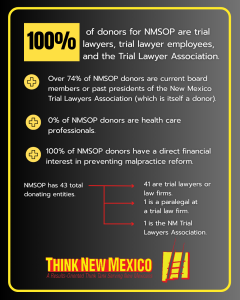 As it turns out, 100% of their donors are trial lawyers, law firms, and one paralegal. Over 74% of their donors are current board members or past presidents of the New Mexico Trial Lawyers Association (which is itself listed as a donor). You can see the full list here: sorted alphabetically by donor or sorted by donation amount.
As it turns out, 100% of their donors are trial lawyers, law firms, and one paralegal. Over 74% of their donors are current board members or past presidents of the New Mexico Trial Lawyers Association (which is itself listed as a donor). You can see the full list here: sorted alphabetically by donor or sorted by donation amount.
Thanks to the New Mexico Ethics Commission, the public now knows that NMSOP is a front group for the trial lawyer’s lobby, which is focused on protecting the financial interests of its members. Reforms that Think New Mexico has proposed—like capping attorney’s fees in medical malpractice lawsuits—would put more money in patients’ pockets but would reduce the amount of money going to their attorneys.
A dark money group, New Mexico Safety over Profits (NMSOP), with deep ties to the New Mexico Trial Lawyers Association, attacked Think New Mexico in a recent opinion piece in the Santa Fe New Mexican.
That opinion piece is filled with some wild, over the top conspiracy theories (you can read it here, with our annotations and corrections). You can read our response in the Santa Fe New Mexican at this link.
You can also read the 73-page lawsuit against NMSOP that was filed by the New Mexico Ethics Commission over NMSOP’s refusal to disclose its donors, as well as an investigative piece by Searchlight New Mexico on NMSOP’s misleading practices.
 During the 2025 legislative session, Think New Mexico successfully championed the passage of five major reforms:
During the 2025 legislative session, Think New Mexico successfully championed the passage of five major reforms:
- Senate Bill 88, which creates a permanent trust fund for Medicaid. The fund will receive recurring revenue until it grows to $2 billion, allowing the state to increase the rates it pays providers to care for patients insured by Medicaid. Read more about this reform.
- House Bill 14, an omnibus tax bill that includes a repeal of the gross receipts tax on coinsurance, on top of the existing deduction for co-pays and deductibles. This will reduce state taxes on medical services by nearly $50 million annually. Read more about this reform.
- House Bill 157, which will raise the standards for principal training by creating a separate licensure track for school principals with enhanced mentoring and other support. Read more about this reform.
- House Bill 156, which ensures that New Mexico teachers will be trained in the best practices for how to effectively teach students how to read. Read more about this reform.
- Senate Bill 37, which enhances the Strategic Water Reserve, a water management tool that Think New Mexico first developed two decades ago to keep a little more water in New Mexico’s rivers. Read more about this reform.
Read more news from Think New Mexico
Think New Mexico is a 501(c)(3) tax-exempt nonprofit organization. Our EIN is 31-1611995. Financials and more information is available on our transparency page.
Visit the Action Center!
Take Action
Send an email to your legislators and the governor about policy issues you care about!
 During the 2026 legislative session, Think New Mexico successfully advocated for the passage of five major reforms:
During the 2026 legislative session, Think New Mexico successfully advocated for the passage of five major reforms:
 The 2026 legislative session is underway! Here are brief summaries of the bills we are working on, with links to our Action Center so you can easily contact your legislators and the governor about any of them. Please check back often, as we will continue to add bills to this list as they are introduced.
The 2026 legislative session is underway! Here are brief summaries of the bills we are working on, with links to our Action Center so you can easily contact your legislators and the governor about any of them. Please check back often, as we will continue to add bills to this list as they are introduced. Governor Lujan Grisham called a special legislative session that will convene on Wednesday, October 1.
Governor Lujan Grisham called a special legislative session that will convene on Wednesday, October 1. Earlier this year a dark money group called “New Mexico Safety Over Profit” (NMSOP) was sued by the state Ethics Commission for refusing to comply with the state law that required them to disclose the sources of their funding. NMSOP was the public face of the opposition to Think New Mexico’s proposed reforms to the medical malpractice law during the last legislative session.
Earlier this year a dark money group called “New Mexico Safety Over Profit” (NMSOP) was sued by the state Ethics Commission for refusing to comply with the state law that required them to disclose the sources of their funding. NMSOP was the public face of the opposition to Think New Mexico’s proposed reforms to the medical malpractice law during the last legislative session. As it turns out, 100% of their donors are trial lawyers, law firms, and one paralegal. Over 74% of their donors are current board members or past presidents of the New Mexico Trial Lawyers Association (which is itself listed as a donor). You can see the full list here:
As it turns out, 100% of their donors are trial lawyers, law firms, and one paralegal. Over 74% of their donors are current board members or past presidents of the New Mexico Trial Lawyers Association (which is itself listed as a donor). You can see the full list here: 












